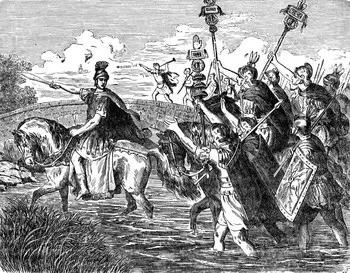Julius Caesar and the Crossing of the Rubicon
|

|
|
Share This Page
|
|
|
|
|
|
|
Follow This Site

|
 |
|
|
|
|

|
Part 2: The Rest of the Story
So here was Caesar, staying in Ravenna, and wanting to consolidate his hold on the hearts and minds of the Roman people (and government). He marched his men to the brink of confrontation and then boldly took them across in history. Some historians differ on exactly how the crossing took place. Suetonius, an ancient Roman historian, had this to say:
 Coming up with his troops on the banks of the Rubicon, which was the frontier of his province, he halted for a while, and revolving in his mind the importance of the step he meditated, he turned to those about him, saying: 'Still we can retreat! But once let us pass this little bridge, - and nothing is left but to fight it out with arms!'
Coming up with his troops on the banks of the Rubicon, which was the frontier of his province, he halted for a while, and revolving in his mind the importance of the step he meditated, he turned to those about him, saying: 'Still we can retreat! But once let us pass this little bridge, - and nothing is left but to fight it out with arms!'
Even as he hesitated this incident occurred. A man of strikingly noble mien and graceful aspect appeared close at hand, and played upon a pipe. To hear him not merely some shepherds, but soldiers too came flocking from their posts, and amongst them some trumpeters. He snatched a trumpet from one of them and ran to the river with it; then sounding the "Advance!" with a piercing blast he crossed to the other side. At this Caesar cried out, 'Let us go where the omens of the Gods and the crimes of our enemies summon us! THE DIE IS NOW CAST!'
Thus, Suetonius could be seen to be arguing, it wasn't Caesar who initiated the treason; rather, he was responding to a charge made by another of his men. "The die is now cast" could be interpreted to mean that the decision was made for him and that he had only to go along.
No matter the interpretation, the fact remained that Caesar and his army were now in violation of one of the oldest laws of them all. The outcry was immediate in Rome itself, with the Senate calling for Caesar to disband his army and submit to their authority. The call went out to  Pompey to come defend his beloved Senate against the intrusion by Caesar. The response by both men was telling: Caesar marched his army into Rome, took over the place, and had a new Senate installed, one that included mostly men favorable to his intentions; Pompey, meanwhile, sailed his army to Greece, there to set up a defensive position and await Caesar's attack.
Pompey to come defend his beloved Senate against the intrusion by Caesar. The response by both men was telling: Caesar marched his army into Rome, took over the place, and had a new Senate installed, one that included mostly men favorable to his intentions; Pompey, meanwhile, sailed his army to Greece, there to set up a defensive position and await Caesar's attack.
The result was the epic Battle of Pharsalus, which resulted in a victory by Caesar, the death of Pompey, and the dawning of a new day in Rome.
First page > Setting the Scene > Page 1, 2
|



 Pompey to come defend his beloved Senate against the intrusion by Caesar. The response by both men was telling: Caesar marched his army into Rome, took over the place, and had a new Senate installed, one that included mostly men favorable to his intentions; Pompey, meanwhile, sailed his army to Greece, there to set up a defensive position and await Caesar's attack.
Pompey to come defend his beloved Senate against the intrusion by Caesar. The response by both men was telling: Caesar marched his army into Rome, took over the place, and had a new Senate installed, one that included mostly men favorable to his intentions; Pompey, meanwhile, sailed his army to Greece, there to set up a defensive position and await Caesar's attack.
